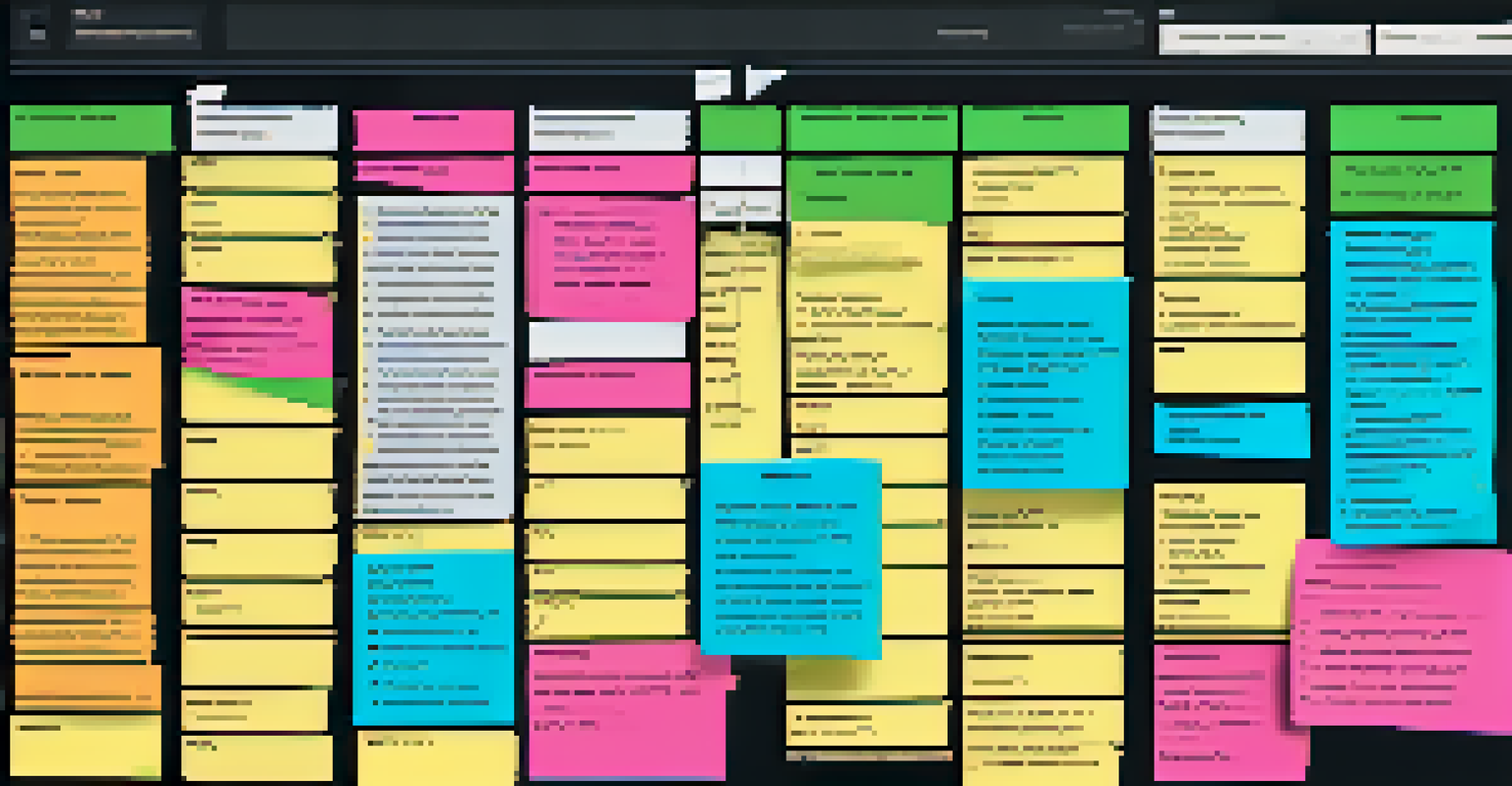The Role of Agile Coaches in Transforming Development Teams

Understanding the Role of Agile Coaches in Development
Agile coaches are vital in guiding development teams through the Agile process. They help teams adopt Agile methodologies, ensuring that everyone understands the principles behind them. By facilitating workshops and providing training, Agile coaches create a strong foundation for teams to thrive in a collaborative environment.
The greatest danger in times of turbulence is not the turbulence; it is to act with yesterday's logic.
One of their primary roles is to mentor team members, helping them embrace Agile practices while fostering a culture of continuous improvement. This means that Agile coaches not only teach the mechanics of Agile but also inspire teams to adopt a mindset that values flexibility and responsiveness. They serve as a bridge between the technical and managerial aspects of the team, ensuring alignment on goals.
Additionally, Agile coaches assess team dynamics and identify barriers to effective collaboration. By observing interactions and providing constructive feedback, they help teams refine their processes. This hands-on approach allows them to tailor their coaching to meet the unique needs of each team, ultimately driving better outcomes.
Fostering Collaboration and Communication Among Teams
One of the key benefits of having an Agile coach is the improvement in collaboration and communication within the team. Agile coaches encourage open dialogue, enabling team members to voice their ideas and concerns without fear. This cultivates a safe space where collaboration can flourish, leading to more innovative solutions.

By facilitating daily stand-up meetings and retrospectives, Agile coaches keep the team focused and aligned on objectives. These practices not only enhance communication but also build trust among team members. Trust is crucial in a collaborative environment, as it allows individuals to take risks and share their perspectives freely.
Agile Coaches Enhance Team Dynamics
They guide teams in adopting Agile practices, fostering collaboration and continuous improvement.
Furthermore, Agile coaches often introduce tools and techniques that enhance team communication. Whether it's using digital boards for task tracking or implementing instant messaging platforms, they ensure that everyone stays connected. This proactive approach helps teams work more efficiently, allowing them to respond quickly to changes and challenges.
Enhancing Flexibility and Responsiveness in Development
Agile methodologies thrive on flexibility, and Agile coaches are instrumental in promoting this trait within development teams. They teach teams how to adapt their processes to respond to feedback and changing requirements effectively. This adaptability not only improves workflow but also leads to higher-quality products that meet user needs.
Agile is not a destination, but a journey of continuous improvement.
Coaches guide teams in prioritizing tasks based on value and urgency, enabling them to focus on what truly matters. By implementing techniques like backlog grooming and sprint planning, they help teams manage their work more efficiently. This structured approach allows teams to pivot quickly, whether to incorporate new features or address unforeseen issues.
Moreover, Agile coaches instill a mindset of experimentation and learning, encouraging teams to embrace change rather than resist it. They remind teams that failure is often a stepping stone to success, fostering resilience. This cultural shift is essential for teams aiming to thrive in today's fast-paced development landscape.
Driving Continuous Improvement Within Development Teams
Continuous improvement is at the heart of Agile methodologies, and Agile coaches play a crucial role in instilling this value. They encourage teams to regularly reflect on their processes and outcomes, identifying areas for enhancement. This practice not only boosts team morale but also leads to better overall performance.
Through regular retrospectives, coaches guide teams in analyzing what went well and what could be improved. This reflection fosters a growth mindset, where team members feel empowered to make changes. The iterative nature of Agile allows teams to implement these improvements quickly, creating a cycle of ongoing enhancement.
Flexibility is Key in Agile
Agile coaches promote adaptability, helping teams respond to feedback and manage tasks efficiently.
Additionally, Agile coaches provide tools and frameworks to measure progress, helping teams track their improvements over time. By celebrating small wins and acknowledging achievements, they motivate teams to stay committed to their growth journey. This focus on continuous improvement ultimately leads to more efficient and effective development processes.
Empowering Teams Through Knowledge and Skill Development
One significant aspect of an Agile coach's role is empowering team members through knowledge sharing and skill development. They provide access to resources, training sessions, and workshops designed to enhance competencies. This investment in team development not only boosts individual skills but also strengthens the team as a whole.
Coaches often tailor their training sessions to address the specific needs of the team, whether it's technical skills or Agile practices. By focusing on practical applications, they ensure that team members can immediately apply what they've learned. This hands-on approach fosters engagement and accelerates learning.
Moreover, Agile coaches encourage a culture of peer learning, where team members share their expertise with one another. This collaborative learning environment enhances team cohesion and builds a sense of ownership. As team members grow in their roles, they become more confident and capable, leading to higher performance levels.
Navigating Challenges and Overcoming Resistance to Change
Transformation isn't always smooth sailing; Agile coaches often encounter resistance to change within teams. It's natural for individuals to feel hesitant about adopting new practices, especially if they're accustomed to traditional methods. Agile coaches play a crucial role in helping teams navigate this resistance.
By providing clear communication and addressing concerns head-on, coaches can alleviate fears associated with change. They emphasize the benefits of Agile practices, illustrating how these methods can lead to improved outcomes. This transparency helps build trust and encourages team members to embrace the new way of working.
Continuous Improvement is Essential
Coaches instill a culture of reflection and growth, empowering teams to regularly enhance their processes.
Furthermore, Agile coaches offer support throughout the transition, guiding teams through challenges as they arise. They help teams develop a problem-solving mindset, empowering them to tackle obstacles collaboratively. This approach not only facilitates smoother transitions but also fosters resilience in the face of future changes.
Measuring Success: Metrics and Evaluation in Agile Teams
To determine the effectiveness of Agile practices, it's essential to establish clear metrics and evaluation methods. Agile coaches help teams identify key performance indicators (KPIs) that align with their goals. These metrics provide valuable insights into how well the team is functioning and where improvements are needed.
Common metrics include velocity, which measures the amount of work completed in a sprint, and customer satisfaction scores. By tracking these indicators, teams can assess their progress and make data-driven decisions. Agile coaches encourage teams to regularly review these metrics, fostering a culture of accountability and continuous improvement.

Additionally, coaches help teams celebrate successes, no matter how small. Recognizing achievements boosts team morale and reinforces the value of their hard work. This positive reinforcement encourages teams to remain committed to their Agile journey, ultimately leading to sustained success in their development efforts.